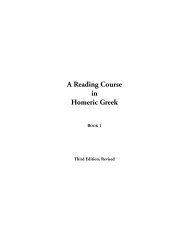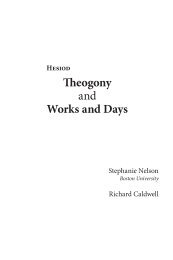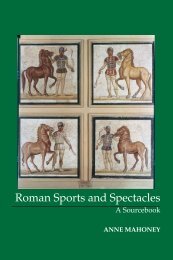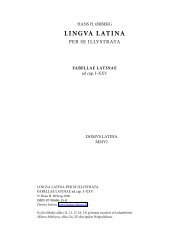Aristophanes: Frogs Jeffrey Henderson - Focus Publishing
Aristophanes: Frogs Jeffrey Henderson - Focus Publishing
Aristophanes: Frogs Jeffrey Henderson - Focus Publishing
Create successful ePaper yourself
Turn your PDF publications into a flip-book with our unique Google optimized e-Paper software.
<strong>Focus</strong> Classical Library<br />
R. Pullins Company<br />
<strong>Aristophanes</strong>: <strong>Frogs</strong><br />
Translated with<br />
Introduction and Notes<br />
<strong>Jeffrey</strong> <strong>Henderson</strong><br />
Boston University
The <strong>Focus</strong> classical library<br />
Series Editors • James Clauss and Stephen Esposito<br />
<strong>Aristophanes</strong>: Acharnians • <strong>Henderson</strong> • 1992 • 1-58510-087-0<br />
<strong>Aristophanes</strong>: The Birds • <strong>Henderson</strong> • 1999 • 0-941051-87-0<br />
<strong>Aristophanes</strong>: Clouds • <strong>Henderson</strong> • 1992 • 0-941051-24-2<br />
<strong>Aristophanes</strong>: <strong>Frogs</strong> • <strong>Henderson</strong> • 2008 • 978-1-58510-308-9<br />
<strong>Aristophanes</strong>: Lysistrata • <strong>Henderson</strong> • 1988 • 0-941051-02-1<br />
<strong>Aristophanes</strong>: Three Comedies: Acharnians, Lysistrata, Clouds • <strong>Henderson</strong> • 1997 • 0-941051-58-7<br />
Euripides: The Bacchae • Esposito • 1998 • 0-941051-42-0<br />
Euripides: Four Plays: Medea, Hippolytus, Heracles, Bacchae • Esposito, ed. • 2003 • 1-58510-048-X<br />
Euripides: Hecuba • Mitchell-Boyask • 2006 • 1-58510-148-6<br />
Euripides: Heracles • Halleran • 1988 • 0-941051-01-3<br />
Euripides: Hippolytus • Halleran • 2001 • 0-941051-86-2<br />
Euripides: Medea • Podlecki • 2005, Revised • 0-941051-10-2<br />
Euripides: The Trojan Women • Clay • 2005 • 1-58510-111-7<br />
Golden Verses: Poetry of the Augustan Age • Alessi • 2003 • 1-58510-064-1<br />
Golden Prose in the Age of Augustus • Alessi • 2004 • 1-58510-125-7<br />
Hesiod: Theogony • Caldwell • 1987 • 0-941051-00-5<br />
The Homeric Hymns • Shelmerdine • 1995 • 1-58510-019-6<br />
Ovid: Metamorphoses • Ambrose • 2004 • 1-58510-103-6<br />
Plautus: Captivi, Amphitryon, Casina, Pseudolus • Christenson • 2008 • 978-1-58510-155-9<br />
Sophocles: Antigone • Blondell • 1998 • 0-941051-25-0<br />
Sophocles: Electra • Roisman • 2008 • 978-1-58510-281-5<br />
Sophocles: King Oidipous • Blondell • 2002 • 1-58510-060-9<br />
Sophocles: Oidipous at Colonus • Blondell • 2003 Revised • 1-58510-065-X<br />
Sophocles: Philoktetes • Schein • 2003 • 1-58510-086-2<br />
Sophocles: The Theban Plays • Blondell • 2002 • 1-58510-037-4<br />
Terence: Brothers (Adelphoe) • Mercier • 1998 • 0-941051-72-2 [VHS • 0-941051-73-0]<br />
Vergil: The Aeneid • Caldwell • 2004 • 1-58510-077-3<br />
Cover Photo: Copyright Alex Bramwell<br />
Copyright © 2008 <strong>Jeffrey</strong> <strong>Henderson</strong><br />
ISBN 13: 978-1-58510-308-9<br />
ISBN 10: 1-58510-308-X<br />
This book is published by <strong>Focus</strong> <strong>Publishing</strong>/R Pullins Company, PO Box 369,<br />
Newburyport MA 01950 All rights are reserved. No part of this publication may be<br />
reproduced, stored in a retrieval system, produced on stage or otherwise performed,<br />
transmitted by any means, electronic, mechanical, by photocopying, recording, or by<br />
any other media or means without the prior written permission of the publisher.<br />
10 9 8 7 6 5 4 3 2 1 0<br />
0408W
Contents<br />
Introduction .................................................................1<br />
<strong>Aristophanes</strong> and Old Comedy .........................1<br />
Production ............................................................9<br />
<strong>Frogs</strong> and its Time ..............................................12<br />
The Translation ..................................................17<br />
Bibliography ......................................................18<br />
<strong>Frogs</strong> .............................................................................21
<strong>Aristophanes</strong> and Old Comedy<br />
INTRODUCTION<br />
<strong>Aristophanes</strong> of Athens, the earliest comic playwright from whom<br />
whole works survive, was judged in antiquity to be the foremost poet<br />
of Old Attic Comedy, a theatrical genre of which he was one of the last<br />
practitioners and of which his eleven surviving plays are our only complete<br />
examples. His plays are valued principally for the exuberance of<br />
their wit and fantasy, for the purity and elegance of their language, and<br />
for the light they throw on the domestic and political life of Athens in<br />
an important era of its history. Legend has it that when the Syracusan<br />
tyrant Dionysius wanted to inform himself about “the republic of the<br />
Athenians,” Plato sent him the plays of <strong>Aristophanes</strong>.<br />
Little is known about <strong>Aristophanes</strong>’ life apart from his theatrical<br />
career. He was born ca. 447/6, the son of one Philippus of the urban<br />
deme Cydathenaeum and the tribe Pandionis, and he died probably<br />
between 386 and 380. By his twenties his hair had thinned or receded<br />
enough that his rivals could call him bald. He seems to have had landholdings<br />
on, or some other connection with, the island of Aegina, a<br />
connection that detractors and enemies exploited early in his career in<br />
an attempt to call his Athenian citizenship into question. In the 420s<br />
he was twice prosecuted by a fellow demesman, the popular politician<br />
Cleon, for the political impropriety of two of his plays (Babylonians of<br />
426 and Knights of 424), but neither time was he convicted. Early in the<br />
fourth century he represented his tribe in the prestigious government<br />
position of Councillor. Four comic poets of the fourth century, Araros,<br />
Philetaerus, Philippus and Nicostratus, are reputed in ancient sources<br />
to be his sons.<br />
In his dialogue Symposium Plato chose <strong>Aristophanes</strong> to represent<br />
comedy, a sign that soon after his death <strong>Aristophanes</strong> was already regarded<br />
as the genre’s preeminent practitioner. Plato portrays him as be-<br />
1
2 • <strong>Aristophanes</strong>: <strong>Frogs</strong><br />
ing at home among the social and intellectual elite of Athens. Although<br />
the historical truth of Plato’s portrayal is uncertain, subsequent tradition<br />
agreed about <strong>Aristophanes</strong>’ professional and literary stature, and<br />
<strong>Aristophanes</strong>’ plays do generally espouse the social, moral and political<br />
sentiments of contemporary upper-class conservatives: nostalgia for<br />
the good old days of the early democracy, which defeated the Persians<br />
and built the empire; dismay at the decadence, corruption and political<br />
divisiveness of his own day; hostility toward the new breed of populist<br />
leaders who emerged after the death of the aristocratic Pericles in 429;<br />
impatience with the leadership and slow progress of the Peloponnesian<br />
War (431-404), particularly when it threatened the interests of the landowning<br />
classes; and unhappiness about many of the artistic and intellectual<br />
trends of his own day, especially those he regarded as harming<br />
the high art of drama. There is no question that <strong>Aristophanes</strong>’ comic<br />
expression of such views reflected, and to a degree shaped, community<br />
opinion, and that comedy could occasionally have a distinc social and<br />
political impact. But the fact that <strong>Aristophanes</strong> emerged politically and<br />
artistically unscathed from the war, from two oligarchic revolutions<br />
(411 and 404), and from two democratic restorations (411 and 403) suggests<br />
that on the whole his role in Athenian politics was more satirical,<br />
moral(istic) and poetical than practical; and the perennial popularity of<br />
his plays would seem to indicate that the sentiments they express were<br />
broadly shared at least among the theatrical public.<br />
The period of Old Comedy at Athens began in 486 BC, when<br />
comedy first became part of the festival of the Greater Dionysia; by<br />
convention it ended in 388 BC, when <strong>Aristophanes</strong> produced his last<br />
play. During this period some 600 comedies were produced. We know<br />
the titles of some fifty comic poets and the titles of some 300 plays. We<br />
have eleven complete plays by <strong>Aristophanes</strong>, the first one (Acharnians)<br />
dating from 425, and several thousand fragments of other plays by<br />
<strong>Aristophanes</strong> and other poets, most of them only a line or so long and<br />
very few deriving from plays written before 440.<br />
The principal occasions for the production of comedies were the<br />
Greater Dionysia, held in late March or early April, and (from 440) the<br />
Lenaea, held in late January or early February. These were national<br />
festivals honoring the wine-god Dionysus, whose cult from very early<br />
times had included mimetic features. The theatrical productions that<br />
were the highlight of the festivals were competitions in which poets,<br />
dancers, actors, producers and musicians competed for prizes that were<br />
awarded by judges at the close of the festival. The Greater Dionysia was<br />
held in the Theater of Dionysus on the south slope of the Acropolis,
Introduction • 3<br />
which accommodated some 17,000 spectators, including both Athenian<br />
and foreign visitors. The Lenaea, which only Athenians attended,<br />
was held elsewhere in the city (we do not know where). By the fourth<br />
century the Lenaea was held in the Theater of Dionysus also, but it is<br />
unclear when the relocation occurred.<br />
At these festivals comedy shared the theater with tragedy and<br />
satyr-drama, genres that had been produced at the Greater Dionysia<br />
since the sixth century. The first “city” contest in tragedy is dated to 534,<br />
when the victorious actor-poet was Thespis (from whose name actors<br />
are still called thespians). But it is not certain that Thespis’ contest was<br />
held at the Greater Dionysia, and in any case this festival seems to have<br />
experienced major changes after the overthrow of the tyranny and the<br />
establishment of democracy, that is, after the reforms of Cleisthenes<br />
in 508. Tragedy dramatized stories from heroic myth, emphasizing<br />
dire personal and social events that had befallen hero(in)es and their<br />
families in the distant past, and mostly in places other than Athens.<br />
By convention, the poetry and music of tragedy were highly stylized<br />
and archaic. Satyr-drama, which was composed by the same poets who<br />
wrote tragedy, had similar conventions, except that the heroic stories<br />
were treated in a humorous fashion and the chorus was composed of<br />
satyrs: mischievous followers of Dionysus who were part human and<br />
part animal.<br />
Comedy, by contrast, had different conventions of performance<br />
(see on Production, below) and was less restricted by conventions of<br />
language, music and subject. That is probably why the composers and<br />
performers of tragedy and satyr-drama were never the same ones<br />
who composed and performed comedy. The language of comedy was<br />
basically colloquial, though it often parodies the conventions of other<br />
(particularly tragic) poetry, and was free to include indecent, even obscene<br />
material. The music and dancing, too, tended to reflect popular<br />
styles. The favorite subjects of comedy were free-form mythological<br />
burlesque; domestic situations featuring everyday character types;<br />
and political satire portraying people and events of current interest in<br />
the public life of the Athenians. Our eleven surviving comedies all fall<br />
into this last category. Mythological and domestic comedy continued<br />
to flourish after the Old Comic period, but political comedy seems to<br />
have died out: a casualty not merely of changing theatrical tastes but<br />
also of the social and political changes that followed the Athenians’<br />
loss of the Peloponnesian War, and with it their empire, in 404. To<br />
understand the significance of political comedy, we must look first at<br />
the political system of which it was an organic feature: the phase of
4 • <strong>Aristophanes</strong>: <strong>Frogs</strong><br />
radical democracy inaugurated by the reforms of Ephialtes in 462/1<br />
and lasting until the end of the century.<br />
Democracy means “rule of the demos” (sovereign people). In fifthcentury<br />
Athens democracy was radical in that the sovereignty of the<br />
demos was more absolute than in any other society before or since.<br />
The demos consisted of all citizen males at least eighteen years of age.<br />
All decisions affecting the governance and welfare of the state were<br />
made by the direct and unappealable vote of the demos. The state was<br />
managed by members of the demos at least thirty years of age, who<br />
were chosen by lot from a list of eligible citizens and who held office<br />
in periods ranging from one day to one year. The only exceptions were<br />
military commanders, who were elected to one-year terms, and holders<br />
of certain ancient priesthoods, who inherited their positions. The demos<br />
determined by vote whether or not anyone holding any public position<br />
was qualified to do his job, and after completion of his term, whether he<br />
had done it satisfactorily. All military commanders, and most holders<br />
of powerful allotted offices, came from the wealthy classes, but their<br />
success depended on the good will of the demos as a whole.<br />
One of the most important allotted offices in the democracy was<br />
that of choregus, sponsor of a chorus. Choregi were allotted from a list<br />
of men wealthy enough to hold this office, for they had to recruit and<br />
pay for the training, costuming and room and board of the chorus that<br />
would perform at one of the festivals. In the case of a comic chorus this<br />
involved 24 dancers and the musicians who would accompany them.<br />
Being choregus gave a man an opportunity to display his wealth and<br />
refinement for the benefit of the demos as a whole and to win a prize<br />
that would confer prestige on himself and his dancers. Some wealthy<br />
men therefore volunteered to be a choregus instead of waiting for their<br />
names to be drawn. On the other hand, a man who put on a cheap or<br />
otherwise unsatisfactory chorus could expect to suffer a significant<br />
loss of public prestige.<br />
All other festival expenses, including stipends for the poet and his<br />
actors and for prizes, were undertaken by vote of the demos and paid<br />
for from public funds. A poet got a place in the festival by submitting<br />
a draft some six months in advance to the office-holder in charge of<br />
the festival. Ancient sources say that at least the choral parts of the<br />
proposed play had to be submitted. How much more was submitted<br />
we do not know. But revision up to the day of the performance was<br />
certainly possible, since many allusions in comedy refer to events<br />
occurring very shortly before the festival: most notably the death of<br />
Sophocles shortly before the performance of <strong>Frogs</strong> in 405.
Introduction • 5<br />
If he got on the program, the poet would be given his stipend and<br />
assigned his actors. He and the choregus would then set about getting<br />
the performance ready for the big day, the poet acting as music master,<br />
choreographer and director, the choregus rounding up, and paying<br />
the expenses of, the best dancers he could find. While tragic poets<br />
produced three tragedies and a satyr-drama, comic poets produced<br />
only one comedy.<br />
Thus comedy, as a theatrical spectacle, was an organic feature of<br />
Athenian democracy. But its poetic, musical and mimetic traditions<br />
were much older, deriving from forms of entertainment developed by<br />
cultivated members of the aristocratic families that had governed Attica<br />
before the democracy. One such traditional form was the komos (band of<br />
revellers), which gave comedy (komoidia “song of the komos”) its name.<br />
A komos was made up of some solidary group (a military, religious or<br />
family group, for example), often in masks or costumes, which entertained<br />
onlookers on many kinds of festive and religious occasions.<br />
Part of the entertainment was abuse and criticism of individuals<br />
or groups standing outside the solidarity of the komos. The victims<br />
might be among the onlookers or they might be members of a rival<br />
komos. The komos sang and danced as a group, and its leader (who<br />
was no doubt also the poet) could speak by himself to his komos, to<br />
the onlookers or to a rival komos-leader. No doubt at a very early stage<br />
the komos was a competitive entertainment by which a given group<br />
could, in artistic ways, make those claims and criticisms against rival<br />
groups which at other times they might make in more overtly political<br />
ways. The targets of komastic abuse were often the village’s most<br />
powerful men and groups. Thus the tradition of the komos was useful<br />
in allowing the expression of personal and political hostilities which<br />
would otherwise have been difficult to express safely: the misbehavior<br />
of powerful individuals, disruptive but unactionable gossip, the<br />
shortcomings of citizens in groups or as a whole. Here komos served a<br />
cathartic function, as a kind of social safety valve, allowing a relatively<br />
harmless airing of tensions before they could become dangerous, and<br />
also as a means of social communication and social control, upholding<br />
generally held norms and calling attention to derelictions.<br />
But in addition to its critical and satiric aspects, komos (like all festive<br />
activities) had an idealistic side, encouraging people to envision the<br />
community as it would be if everyone agreed on norms and lived up<br />
to them, and a utopian side as well, allowing people to imagine how<br />
wonderful life would be if reality were as human beings, especially<br />
ordinary human beings, would like it to be. In this function komos<br />
provided a time-out from the cares and burdens of everyday life.
SPEAKING CHARACTERS<br />
CHARACTERS<br />
<strong>Aristophanes</strong>: <strong>Frogs</strong><br />
Xanthias, slave of Dionysus 1 Innkeeper<br />
Dionysus Plathane, innkeeper<br />
Heracles Slave of Pluto<br />
Corpse Pluto<br />
Charon Euripides<br />
Aeacus, doorman of Pluto Aeschylus<br />
Maid of Persephone<br />
SILENT CHARACTERS<br />
Donkey<br />
Pallbearers<br />
Maids of the Innkeepers<br />
Slaves of Pluto<br />
Scythian policemen (Ditylas, Scebylas, Pardocas)<br />
Muse of Euripides<br />
Persephone<br />
CHORUS of <strong>Frogs</strong><br />
CHORUS of Eleusinian Initiates<br />
1 “Light-Haired,” a common slave-name.<br />
21
22 • <strong>Aristophanes</strong>: <strong>Frogs</strong><br />
SCENE I: PROLOGUE (1-208)<br />
(Xanthias, Dionysus, Heracles, Corpse, Pallbearers, Charon)<br />
Enter DIONYSUS and XANTHIAS from the side. Dionysus, disguised<br />
as Heracles, wears a lionskin over his saffron gown and carries a club; Xanthias<br />
rides a Donkey and carries baggage suspended from a pole that rests on his<br />
shoulder. They make their way toward the stage house.<br />
Xanthias<br />
Hey master, how about some of the usual stuff<br />
that always gets a laugh from the audience?<br />
Dionysus<br />
Why sure, whatever you like, except “I’m hard pressed!”<br />
Watch out for that one; by now it gets only a groan.<br />
Xanthias<br />
Then something urbane?<br />
Dionysus<br />
Xanthias<br />
Well, how about that really funny one?<br />
Except for “I’m getting crushed!” 5<br />
Dionysus<br />
Sure,<br />
go right ahead: only please, not the one where—<br />
Xanthias<br />
you mean—<br />
Dionysus<br />
where you shift your baggage and say you need to shit.<br />
Xanthias<br />
I can’t even say I’ve got such a load on me<br />
that if someone doesn’t relieve me my butt will erupt? 10<br />
Dionysus<br />
Please don’t, I beg you! Wait till I need to puke.<br />
Xanthias<br />
Then why did I have to come humping all this baggage,<br />
if I can’t do any of the stuff that Phrynichus<br />
is always doing? Lycis and Ameipsias too:
Scene I • 23<br />
people hump baggage in every one of their comedies. 2 15<br />
Dionysus<br />
Just don’t, because when I’m in the audience<br />
whenever I see one of those sophisticated bits,<br />
I go back home more than a whole year older.<br />
Xanthias<br />
Then this neck of mine is truly triple-jinxed:<br />
it’s getting crushed but can’t make a funny comment. 20<br />
Dionysus<br />
How’s that for arrogance and being spoiled rotten!<br />
After I, none other than Dionysus son of Flagon, 3<br />
have toiled ahead on foot and let him ride,<br />
so he wouldn’t get tired or have to bear a load.<br />
Xanthias<br />
Aren’t I bearing one?<br />
Dionysus<br />
How can you bear when you’re riding? 25<br />
Xanthias<br />
I’m bearing this.<br />
Dionysus<br />
How?<br />
Xanthias<br />
Quite unbearably!<br />
Dionysus<br />
But doesn’t the donkey bear what you are bearing?<br />
Xanthias<br />
Not what I’ve got here and bear myself, it doesn’t.<br />
Dionysus<br />
But how can you be bearing, when something else bears you?<br />
Xanthias<br />
I haven’t a clue—but this shoulder of mine is hard pressed! 30<br />
Dionysus<br />
OK, since you deny that the donkey’s helping you,<br />
pick up the donkey and take your turn carrying him.<br />
2 Three of <strong>Aristophanes</strong>’ comic competitors; at this festival Phrynichus was<br />
competing against <strong>Frogs</strong> with his Muses and would win second prize.<br />
3 Instead of “son of Zeus,” alluding to Dionysus’ role as wine-god.
24 • <strong>Aristophanes</strong>: <strong>Frogs</strong><br />
Xanthias<br />
Oh blast my luck, why wasn’t I in the sea battle?<br />
Then I’d be telling you to go to hell. 4<br />
Dionysus<br />
Dismount, you scamp! Here I stand at the very door 35<br />
that was supposed to be the first stop of my trip. (knocking)<br />
Boy! Boy, I say, boy! 5<br />
HERACLES is heard from within, then opens the door.<br />
Heracles<br />
Who banged on the door? He assaulted it like a centaur,<br />
whoever— Say now, what’s this supposed to be?<br />
Dionysus<br />
Boy!<br />
Xanthias<br />
What is it?<br />
Dionysus<br />
Xanthias<br />
Dionysus<br />
How scared he was!<br />
Xanthias<br />
Did you see that?<br />
See what? 40<br />
Sure, scared that you’ve lost your mind.<br />
Heracles<br />
I swear to god, I simply can’t stop laughing!<br />
I’m biting my lip, but still I can’t help laughing.<br />
Dionysus<br />
Come here, my man; I’d like a word with you.<br />
Heracles<br />
I’m sorry, but I can’t shake off this laughter. 45<br />
It’s seeing that lionskin atop a yellow gown. 6<br />
4 The Athenian fleet that was victorious at Arginusae the previous summer had<br />
been manned by a great levy that included slaves, who were then rewarded<br />
with freedom.<br />
5 The conventional way of referring to a slave.<br />
6 Normally a woman’s festive garment but regularly worn by Dionysus, sometimes<br />
in combination with masculine clothing.
What’s the idea? Why a war club with lady’s boots?<br />
Where on earth have you been?<br />
Dionysus<br />
Heracles<br />
And did you engage?<br />
Scene I • 25<br />
Serving topside with Cleisthenes. 7<br />
Dionysus<br />
Oh yes, and I also sank<br />
some enemy ships, maybe twelve or thirteen of them. 50<br />
Heracles<br />
You two?<br />
Dionysus<br />
Xanthias<br />
So help me Apollo.<br />
And then I woke up.<br />
Dionysus<br />
Well anyway, as I was up on deck<br />
reading Andromeda 8 to myself, a sudden longing<br />
struck my heart, you can’t imagine how hard.<br />
Heracles<br />
A longing? How big?<br />
Dionysus<br />
Heracles<br />
For a woman?<br />
Dionysus<br />
Heracles<br />
Dionysus<br />
Nope.<br />
Small, the size of Molon. 9 55<br />
A boy, then?<br />
Not in the slightest.<br />
7 Perennially teased for passive homosexuality.<br />
8 This play of Euripides had been produced in 412 and was parodied by<br />
<strong>Aristophanes</strong> the following year in Women at the Thesmophoria (lines<br />
1015-1135).<br />
9 A famous actor and, according to ancient tradition, a large man.
26 • <strong>Aristophanes</strong>: <strong>Frogs</strong><br />
Heracles<br />
For a man, then?<br />
Dionysus<br />
Heracles<br />
Ah ah!<br />
Did you do it with Cleisthenes?<br />
Dionysus<br />
Don’t tease me, brother; 10 I’m truly in a very bad way.<br />
That’s how thoroughly this passion is messing me up.<br />
Heracles<br />
What kind of passion, little brother?<br />
Dionysus<br />
It’s hard to put into words, 60<br />
but I’ll try to explain it to you by analogy.<br />
Have you ever had a sudden craving for minestrone?<br />
Heracles<br />
Minestrone? Oh my, thousands of times in my life!<br />
Dionysus<br />
Am I being clear, or should I express it another way?<br />
Heracles<br />
No problem with minestrone; I get the point. 65<br />
Dionysus<br />
Well, that’s the kind of longing that’s eating me up —<br />
for Euripides.<br />
Heracles<br />
You mean, even dead and all?<br />
Dionysus<br />
And nobody on earth can persuade me not<br />
to go after him.<br />
Heracles<br />
To go even below to Hades?<br />
Dionysus<br />
By heaven, even if there’s somewhere below that. 70<br />
10 Dionysus and Heracles were both sons of Zeus respectively by Semele and<br />
Alcmene.
Heracles<br />
What is it you want?<br />
Dionysus<br />
I need a talented poet,<br />
“for some are gone, and those that live are bad.” 11<br />
Heracles<br />
How so? Isn’t Iophon alive? 12<br />
Scene I • 27<br />
Dionysus<br />
Yes, and he’s the only<br />
class act left, that is, if he really is one;<br />
for I’m not exactly sure how that stands either. 75<br />
Heracles<br />
If you’re really set on resurrecting someone,<br />
then why not Sophocles instead of Euripides?<br />
Dionysus<br />
No, first I want to get Iophon by himself<br />
without Sophocles and evaluate what he produces.<br />
Besides, Euripides is a slippery character 80<br />
and would probably even help me pull off an escape,<br />
while Sophocles was mild here and will be mild there.<br />
Heracles<br />
And where is Agathon? 13<br />
Dionysus<br />
He’s gone and left me,<br />
An excellent poet and very much missed by his friends. 14<br />
Heracles<br />
Where on earth to, poor thing?<br />
Dionysus<br />
To party with the Blest. 85<br />
11 From Euripides’ Oeneus (fragment 565).<br />
12 A son of Sophocles and a successful tragic poet.<br />
13 Agathon, victorious in his debut in 416 (commemorated in Plato’s Symposium) and<br />
famous both for his innovative style and his personal beauty, had left Athens<br />
with his lover Pausanias for the court of Archelaus of Macedon around 408; he<br />
was portrayed in <strong>Aristophanes</strong>’ Women at the Thesmophoria (produced in 411).<br />
14 Or, with a variant reading, “by the wise.”
28 • <strong>Aristophanes</strong>: <strong>Frogs</strong><br />
Heracles<br />
And what about Xenocles? 15<br />
Dionysus<br />
To hell with him!<br />
Heracles<br />
And Pythangelus? 16<br />
Xanthias<br />
But nary a word about me,<br />
though my shoulder here’s getting ever so badly bruised?<br />
Heracles<br />
But aren’t there other poets here, lads busy<br />
composing tragedies by the tens of thousands 90<br />
and out-blabbering Euripides by a mile?<br />
Dionysus<br />
All those are cast-offs and merely empty chatter,<br />
choirs of swallows, wreckers of their art,<br />
who maybe get a chorus and are soon forgotten,<br />
after having their single piss upon Tragedy. 95<br />
But if you look for a potent poet, one who could utter<br />
a lordly phrase, you won’t find any left.<br />
Heracles<br />
What do you mean, “potent”?<br />
Dionysus<br />
Potent, as in one<br />
who can give voice to something adventuresome,<br />
like “Aether, Bedchamber of Zeus,” 17 or “Time’s Foot,” 18 100<br />
or a heart unwilling to swear on ritual victims,<br />
and a tongue forsworn separately from the heart. 19<br />
Heracles<br />
You like that stuff?<br />
15 A son of the tragic poet Carcinus who defeated Euripides’ Trojan trilogy in<br />
415.<br />
16 Otherwise unknown.<br />
17 Misquoting Euripides’ Wise Melanippe (fragment 487), “Aether, Zeus’ abode.”<br />
18 Euripides’ Alexander (fragment 42), Bacchae, line 889.<br />
19 Paraphrasing a notorious line from Euripides’ Hippolytus (612), “My tongue has<br />
sworn, but my heart is not under oath.”
Dionysus<br />
Me like it? I’m crazy about it!<br />
Heracles<br />
It’s pure blarney; you know it as well as I do.<br />
Scene I • 29<br />
Dionysus<br />
Don’t manage my mind, 20 but mind your own business. 105<br />
Heracles<br />
Oh come on now, it’s obviously utter rubbish.<br />
Dionysus<br />
Oh stick to your specialty: eating!<br />
Xanthias<br />
Not a word about me!<br />
Dionysus<br />
Well, as to the reason I’ve come here wearing this outfit<br />
in imitation of you is so you’ll tell me<br />
about those friends of yours who put you up 110<br />
that time when you went after Cerberus, 21<br />
in case I need them. Tell me about the harbors,<br />
the bakeries, whorehouses, rest areas, directions,<br />
the springs, roads, cities, places to stay, the landladies<br />
with the fewest bedbugs.<br />
Xanthias<br />
Not a word about me! 115<br />
Heracles<br />
You madcap, would you dare to go there too? 22<br />
Dionysus<br />
Just drop that subject, and give me the directions,<br />
my quickest route on down to Hades, and mind<br />
you don’t give me one that’s too hot or too cold.<br />
Heracles<br />
All right, which one shall I give you first? Let’s see. 120<br />
Well, there’s one via rope and bench: you hang yourself.<br />
20 Euripides’ Andromeda (fragment 144).<br />
21 The three-headed watchdog of Hades, fetched up by Heracles in the last of his<br />
labors.<br />
22 In portraying this as Dionysus’ first trip to the underworld, <strong>Aristophanes</strong> apparently<br />
ignores the myths of his trip there to rescue his mother Semele.
30 • <strong>Aristophanes</strong>: <strong>Frogs</strong><br />
Dionysus<br />
Oh stop it, that way’s stifling.<br />
Heracles<br />
Well, there’s a shortcut<br />
that’s well-beaten—in a mortar.<br />
Dionysus<br />
Heracles<br />
Exactly.<br />
You mean hemlock?<br />
Dionysus<br />
That’s a chill and wintry way! 125<br />
It quickly freezes your shins as hard as ice.<br />
Heracles<br />
How about quick and downhill?<br />
Dionysus<br />
Heracles<br />
Then stroll to the Cerameicus 23 —<br />
Dionysus<br />
Heracles<br />
climb up the tower, the high one—<br />
Dionysus<br />
Sure: I’m not much for hiking.<br />
And then do what?<br />
And then do what? 130<br />
Heracles<br />
You watch the start of the torch race from up there,<br />
and when the spectators start to cry “they’re off,”<br />
then off you go as well.<br />
Dionysus<br />
Heracles<br />
Off where?<br />
Off down!<br />
Dionysus<br />
But I’d be wasting a pair of brain croquettes.<br />
I’d rather not stroll that route.<br />
23 “Potters’ Town,” a district of Athens extending northwest of the Agora.
Heracles<br />
Dionysus<br />
The same way you went.<br />
Scene I • 31<br />
Then how will you go? 135<br />
Heracles<br />
Well, that’s a lengthy voyage.<br />
First of all you’ll come to a very large lake,<br />
quite bottomless.<br />
Dionysus<br />
Then how will I get across it?<br />
Heracles<br />
An ancient mariner will ferry you across<br />
in a skiff no bigger than this, for a fare of two obols. 24 140<br />
Dionysus<br />
Amazing the power those two obols everywhere have!<br />
How did they get down there?<br />
Heracles<br />
Theseus brought them. 25<br />
After that, you’ll see an infinity of serpents and beasts<br />
most frightful.<br />
Dionysus<br />
Don’t try to shock or scare me off:<br />
you’ll not deter me.<br />
Heracles<br />
Then you’ll see a lot 145<br />
of mud and ever-flowing shit; and therein lies<br />
anyone who ever wronged a stranger,<br />
or snatched back a boy’s fee while screwing him,<br />
or beat his mother up, or socked his father<br />
right in the mouth, or falsely swore an oath, 150<br />
or had someone copy out a speech by Morsimus. 26<br />
24 The traditional fare was one obol; here “two obols” probably refers to the twoobol<br />
public dole introduced by the politician Cleophon in 410; some have thought<br />
that it refers to the price of a theater ticket, but then “everywhere” (i.e., not only<br />
in Athens) is hard to explain.<br />
25 The underworld journey of Theseus, an Athenian hero, was well known and<br />
was dramatized in the tragedy Perithous (date of production unknown), which<br />
in antiquity was attributed to Critias but alternatively to Euripides.<br />
26 Son of the tragic poet Philocles and great-nephew of Aeschylus; ridiculed elsewhere<br />
in comedy as a bad tragedian.















